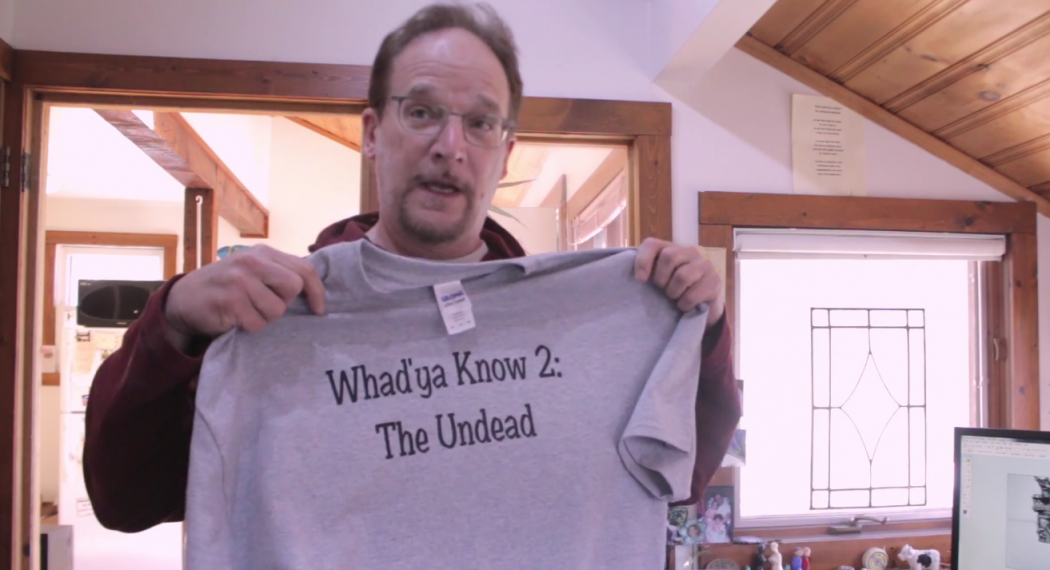“What I got was funny Feldman, to be sure, but he was also surprisingly open.”
If you watch the footage of Whad’Ya Know?‘s final broadcast, one thing is pretty clear: neither host Michael Feldman nor his zealous listeners were quite ready to give up on the long-running comedy quiz show — even after spending 31 years at Wisconsin Public Radio. Feldman’s personality has been central to the program’s success, fostering multiple generations of fans through his dry-humored quirks — and even if the host insists on the contrary.
Feldman’s relationship with the show, its listeners, and his life work are central explorations in the aptly titled Whad’Ya Do Now? from director Marc Kornblatt. Kornblatt himself is no stranger to introspection. Both Still 60 and What I Did in Fifth Grade marry reflexive, self-deprecating sensibilities with gonzo journalism for documentaries heightened by their experiential qualities and refreshing bluntness. Whad’Ya Do Now? finds the director at a comparative distance from his subject this time, but it’s a distance that Feldman himself compensates with his own candidness. Before his big opening night roll-out at the Wisconsin Film Festival, I asked Kornblatt “5 Questions:”
1. Were you a fan of Whad’ya Know? before this?
No. For quite a few years, I was Sabbath observant and didn’t listen to the radio. The times I did tune in, I appreciated Feldman’s wit, but I never became a fan.
2. Both you and Feldman orient the audience to the show’s background, but you never really reference old broadcasts. You’re not reaching back to any “archives,” so to speak, because it’s not really about the show. Was that a conscious decision to make Whad’ya Do Now? less a biography and more like a document of a moment?
Whad’Ya Do Now? is not a biography, but rather a close-up look at a man at a certain point in his life. Part of what Feldman does is reminisce, but he is actually more interested in looking ahead, which is what appealed to me. I was not reaching back for two reasons. First, I was most concerned with Feldman’s final months of his long run and what that meant to him. Second, a detailed looking back would have called for a longer film, which I was not prepared to do. Archival work is painstaking, time-consuming work, and not my thing. If I had secured funding, I would have hired someone to take on that task. I’ll leave the definitive Michael Feldman bio-pic to someone else.
3. Introspection is in so much of your work, so it was hard for me not to read that in Feldman, too. Did you pick up on that similarity when you were developing this?
To be honest, I didn’t know what I was going to get with Michael Feldman. When I first reached out to him via email, he was clever and coy, so I was expecting him to be a challenging interview, more guarded and caustic than vulnerable. What I got was funny Feldman, to be sure, but he was also surprisingly open. I’d like to think I was able to bring out the introspective part of the man, but he would probably tell you that he was just humoring me, because I seemed so ardent and sincere. Perhaps my reaching out to him when he was down was what made the difference. I happened to think we clicked, but I can’t tell you what Feldman thinks.
4. Feldman has a podcast now and has made ample use of his YouTube channel. Knowing your affinity for financially-savvy productions, were you an influence on that transition beyond traditional media?
I do not think that my cheapness — There! I’m not afraid to admit it — influenced Feldman’s transition to podcasting. He had already come up with the idea before we began our interview, and he was already on YouTube well before I was even a twinkle in his eye.
5. Has his “media-life crisis” influenced how you think about your own relationship with art?
Michael Feldman had a regular public radio gig for three decades. He enjoyed a level of fame, and financial security, while pursuing his art that I have never achieved in my three decades as an actor, turned playwright/screenwriter, turned journalist, turned children’s book author, turned filmmaker. I have devoted my life to art because, come hell or high water, I’m an artist, and that’s that. Comparing Feldman suffering a “media-life crisis” for the past year to my dogged pursuit of the muse for as long as he was on the radio is like comparing Mickey Mantle being told to hang up his cleats to Butchie McDougall, balding and growing a paunch, still plugging away in AA ball. I suppose one thing Feldman and I have in common is that, to borrow a Yiddish word that he would understand, we both like to kvetch.
- Whad’Ya Do Now? plays as part of “Transmissions From the Heartland — Wisconsin’s Own Short Documentaries” on Thurs, Mar 30 at 7:00p in the Barrymore Theatre.

